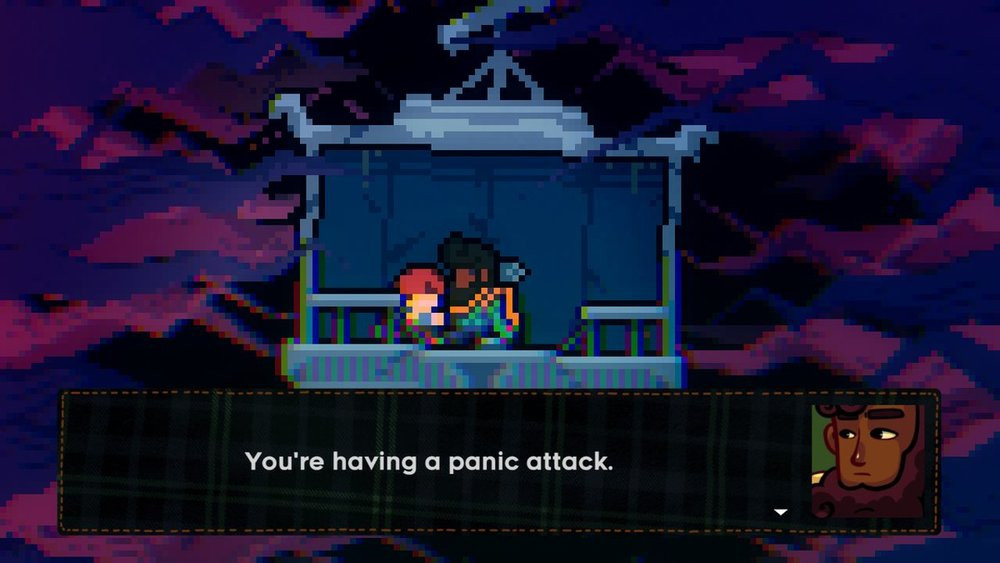
My Biggest Revelations of 2018 Came from an Indie Video Game
December 28, 2018It’s a rare luxury to play a game where you feel a real sense of kinship with the main character, much less one that encourages you to take better care of yourself. Celeste is both of these things—a bundle of contradictions that somehow meshes self-care, witty dialogue, and devilishly difficult gameplay into a platform game (or “platformer”).
Unlike classic platformers that drag you through levels to rescue the kidnapped princess or to foil a supervillain, Celeste’s motives are purely internal. It’s protagonist Madeline’s own depression and anxiety that drives her to climb Celeste mountain—partially for the punishing masochism of the trek and partially to seek catharsis. Thanks to its focus on mental health, this story is, “quieter, more introspective, and focused on a personal scale,” Matt Thorson, the creator of Celeste, wrote me over email.
It’s clearly resonated with fans, as Celeste has sold more than half a million copies (a large amount for an indie game) since its release January 2018. The unorthodox narrative was inspired by Thorson’s own struggles with mental health. “I was dealing with issues similar to those that Madeline struggles with in the game,” he wrote. “It made sense to construct this character and world, because I find it easier to think about these things in terms of a fictional character.”
As Madeline climbs, Celeste Mountain manifests her mental illness into a physical form. Madeline’s anxiety and depression are transformed into a physical ghostly “shadow” of her own form, and serves as the primary enemy of the game. This “shadow Madeline” taunts you as you traverse the various levels of mountain climbing. She’s condescending and self-defeating, negging you with lines like: “You are many things, darling, but you are not a mountain climber.” Though she’s mortally threatening, this emotional manipulation is far more lacerating than any of the physical damage she deals.

Celeste’s developers didn’t consult mental health professionals when building in these tools, leaning on Thorson’s lived experiences instead. But this makes Madeline’s story feel more personal, less calculated. “As someone who has dealt with anxiety for basically my entire life, I learned to focus on my breathing to stay calm a long time ago and took it for granted,” Thorson explained. “It was only recently that I became more aware of the significance of this kind of breathing exercise...Ultimately, the feather couldn't prevent Madeline from falling back into her pattern of running from her feelings, but it still is an important part of her recovery that helps her fight her way back up from the bottom.”
And unlike so many modern platformers, Celeste comes with an “assist mode” that doesn’t demean players for using it. Rather than labeling this mode “easy” or “sandbox” in ways that feel diminutive, assist mode allows you to customize your gameplay—you can slow the gameplay speed down, give yourself an infinite amount of air jumps, or make yourself invincible. You’re invited to use assist mode if the game notices you failing to advance. Similarly, loading screens include peppy messages like “You can do this,” and “Just breathe.” This positivity has been valuable to so many fellow gamers who “connect with Madeline’s story and relate to her so much,” Thorson wrote. “I get emotional when I see posts where people use the game to contextualize their anxiety or depression, talk about it with others.”
Madeline never “defeats” her anxiety and depression. Though you spend the majority of the trek fighting against and trying to escape “shadow Madeline”—or, rather, her self-loathing and low self-esteem—you ultimately crest the mountain by realizing that mental illness isn’t something you can browbeat into submission. Madeline learns that hating her anxiety and depression only exacerbate their effects. By accepting every facet of her personality, and learning to be kinder to herself, Madeline finally climbs Celeste Mountain.
“Creating this game and guiding Madeline through her journey made it obvious to me that acceptance was the only way forward,” Thorson wrote me. We all owe ourselves that kind of realization.
Sign up for our newsletter to get the best of VICE delivered to your inbox daily.
Follow Nicole Clark on Twitter.


